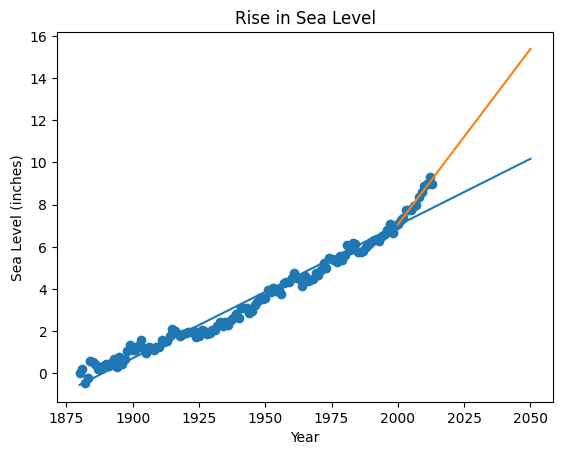%pip install scipy pandas matplotlibimport matplotlib.pyplot as plt
import pandas as pd
from scipy.stats import linregress# Read data from file
df = pd.read_csv("data/epa-sea-level.csv")
print(df.describe())
print(df.info())
print(df.head()) Year CSIRO Adjusted Sea Level Lower Error Bound \
count 134.000000 134.000000 134.000000
mean 1946.500000 3.650341 3.204666
std 38.826537 2.485692 2.663781
min 1880.000000 -0.440945 -1.346457
25% 1913.250000 1.632874 1.078740
50% 1946.500000 3.312992 2.915354
75% 1979.750000 5.587598 5.329724
max 2013.000000 9.326772 8.992126
Upper Error Bound NOAA Adjusted Sea Level
count 134.000000 21.000000
mean 4.096016 7.363746
std 2.312581 0.691038
min 0.464567 6.297493
25% 2.240157 6.848690
50% 3.710630 7.488353
75% 5.845472 7.907365
max 9.661417 8.546648
<class 'pandas.core.frame.DataFrame'>
RangeIndex: 134 entries, 0 to 133
Data columns (total 5 columns):
# Column Non-Null Count Dtype
--- ------ -------------- -----
0 Year 134 non-null int64
1 CSIRO Adjusted Sea Level 134 non-null float64
2 Lower Error Bound 134 non-null float64
3 Upper Error Bound 134 non-null float64
4 NOAA Adjusted Sea Level 21 non-null float64
dtypes: float64(4), int64(1)
memory usage: 5.4 KB
None
Year CSIRO Adjusted Sea Level Lower Error Bound Upper Error Bound \
0 1880 0.000000 -0.952756 0.952756
1 1881 0.220472 -0.732283 1.173228
2 1882 -0.440945 -1.346457 0.464567
3 1883 -0.232283 -1.129921 0.665354
4 1884 0.590551 -0.283465 1.464567
NOAA Adjusted Sea Level
0 NaN
1 NaN
2 NaN
3 NaN
4 NaN def draw_plot():
x = df["Year"]
y = df["CSIRO Adjusted Sea Level"]
# Create scatter plot
plt.scatter(x, y)
# Create first line of best fit
# Adapted from https://stackoverflow.com/questions/61205263/how-can-i-extend-a-linear-regression-line-and-predict-the-future
extended_x_1 = [*range(df.iloc[0, 0], 2051, 1)]
res = linregress(x, y)
line = [res.slope * x + res.intercept for x in extended_x_1]
plt.plot(extended_x_1, line)
# Create second line of best fit
x_2000_2050 = df.loc[df["Year"] >= 2000, "Year"]
y_2000_2050 = df.loc[df["Year"] >= 2000, "CSIRO Adjusted Sea Level"]
extended_x_2 = [*range(2000, 2051, 1)]
res_2000_2050 = linregress(x_2000_2050, y_2000_2050)
line_2000_2050 = [
res_2000_2050.slope * x + res_2000_2050.intercept for x in extended_x_2
]
plt.plot(extended_x_2, line_2000_2050)
# Add labels and title
plt.xlabel("Year")
plt.ylabel("Sea Level (inches)")
plt.title("Rise in Sea Level")
# plt.savefig("sea_level_plot.png")
return plt.gca()
plt.show(draw_plot())